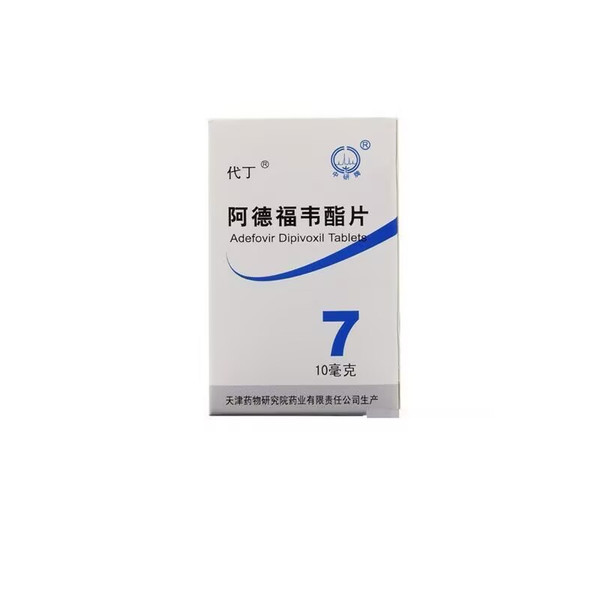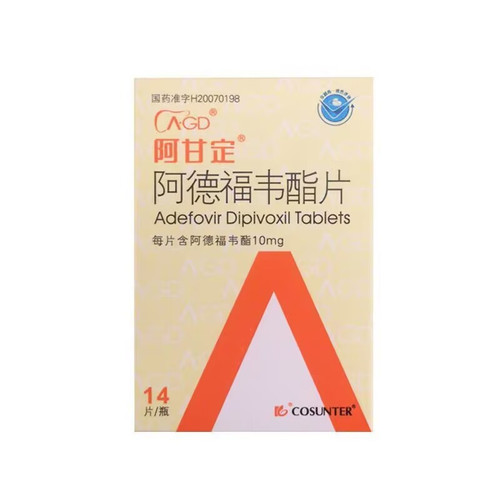Product Overview
[Drug Name]
Generic Name: Adefovir Dipivoxil Tablets
Trade Name: Daiding
English Name: Adefovir Dipivoxil Tablets
Chinese Pinyin: A De Fu Wei Zhi Pian
[Ingredients]
The main ingredient of this product is adefovir dipivoxil. Chemical name: 9-[2-[Bis(pivaloyloxy)methoxy]phosphinyl]methoxy]ethyl]adenine.
[Properties]
This product is white to off-white tablets.
[Indications]
This product is indicated for the treatment of adult patients with chronic hepatitis B who have active hepatitis B virus replication and persistently elevated serum aminotransferase levels and compensated liver function.
[Dosage and Administration]
This product must be used under the guidance of a physician experienced in the treatment of chronic hepatitis B. Adults (18-65 years): The recommended dose is 10 mg once daily, taken orally before or after meals. The optimal duration of treatment has not yet been determined. Do not exceed the recommended dose. Patients should regularly monitor hepatitis B biochemical, virological, and serum markers at least every six months.
[Adverse Reactions]
Common adverse reactions in international clinical studies included weakness, headache, abdominal pain, nausea, flatulence, diarrhea, and dyspepsia. Adverse reactions in domestic clinical studies included fatigue, mild leukopenia, mild diarrhea, moderate alopecia, abnormal urine protein, elevated creatinine, and reversible elevations in liver transaminases.
[Contraindications]
Adefovir dipivoxil is contraindicated in patients with confirmed hypersensitivity to any component of this product.
[Precautions]
1. Patients who discontinue hepatitis B treatment, including adefovir dipivoxil, may experience acute exacerbations of hepatitis. Therefore, patients who discontinue hepatitis B treatment should closely monitor liver function and, if necessary, resume anti-hepatitis B treatment. 2. Chronic treatment with adefovir dipivoxil can cause nephrotoxicity in patients with renal impairment or at risk of renal impairment. These patients should closely monitor renal function and adjust the dose appropriately. 3. Before treatment with adefovir dipivoxil, all patients should undergo human immunodeficiency virus (HIV) antibody testing. Use of anti-hepatitis B medications, such as adefovir dipivoxil, can affect unknown or untreated HIV in patients with chronic hepatitis B, potentially leading to HIV resistance. 4. Nucleoside analogs, used alone or in combination with other antiretroviral drugs, can cause lactic acidosis and severe hepatomegaly with steatosis, including fatal outcomes. 5. Because the risk to the developing human embryo is unknown, women of childbearing age treated with adefovir dipivoxil are advised to use effective contraceptive measures.
[Use in Special Populations]
Precautions for Children:
The efficacy and safety of adefovir dipivoxil in patients under 18 years of age have not been established. This product is not suitable for use in children and adolescents.
Precautions for Pregnancy and Lactation:
The effects of adefovir dipivoxil on mother-to-child transmission of HBV have not been studied during pregnancy. Therefore, infants should be immunized to prevent infection with the HBV. It is not known whether adefovir is excreted in human breast milk; lactating women should avoid breastfeeding while using this product.
Precautions for Elderly Patients:
The efficacy and safety of adefovir dipivoxil in patients aged 65 and over have not been established.
[Drug Interactions]
Adefovir dipivoxil is rapidly converted to adefovir in vivo. At concentrations significantly higher than those observed in vivo (4000-fold), adefovir does not inhibit any of the following common human CYP450 enzymes: CYP1A2, CYP2C9, CYP2C19, CYP2D6, and CYP3A4. Adefovir is not a substrate for these enzymes. However, it is unknown whether adefovir induces CYP450 enzymes. Based on in vitro results and the renal elimination pathway of adefovir, interactions with other drugs, either as inhibitors or substrates, mediated by CYP450, are unlikely. Adefovir is excreted through the kidneys via glomerular filtration and active tubular secretion. Coadministration of 10 mg of adefovir dipivoxil with other drugs secreted through the renal tubules or drugs that alter renal tubular secretion may increase serum concentrations of adefovir dipivoxil or the coadministered drug. Coadministration of 10 mg of adefovir dipivoxil with 100 mg of lamivudine did not alter the pharmacokinetic properties of either drug. Caution should be exercised when coadministering 10 mg of adefovir dipivoxil with drugs secreted through the renal tubules, as the two drugs compete for the same elimination pathway, potentially increasing serum concentrations of adefovir or the coadministered drug.
[Pharmacological Actions]
Pharmacological Actions: Mechanism of Action: Adefovir is an acyclic nucleoside analog of adenosine monophosphate that is phosphorylated by cellular kinases to its active metabolite, adefovir diphosphate. Adefovir diphosphate inhibits HBV DNA polymerase (reverse transcriptase) through two mechanisms: competition with the natural substrate deoxyadenosine triphosphate (DATP) and termination of DNA chain elongation following integration into viral DNA. The inhibition constant (Ki) of adefovir diphosphate against HBV DNA polymerase is 0.1 μM, but its inhibitory activity against human DNA polymerases alpha and gamma is weaker, with Ki values of 1.18 μM and 0.97 μM, respectively. Antiviral activity: In human hepatoma cell lines transfected with HBV, the concentration of adefovir required for 50% inhibition of viral DNA replication (IC50) ranged from 0.2 to 2.5 μM. Drug resistance: Long-term drug resistance analysis (96 to 144 weeks) in patients with detectable serum HBV DNA despite adefovir dipivoxil treatment identified the rtN236T and rtA181V mutations as associated with adefovir resistance. In vitro studies have found that the rtN236T variant reduces HBV susceptibility to adefovir by 4- to 14-fold, with serum HBV DNA rebound observed in 6 of 6 patients harboring this variant. The rtA181V variant reduces HBV susceptibility to adefovir by 2.5- to 3-fold, with rebound observed in 2 of 3 patients harboring this variant. The incidence of mutations associated with adefovir resistance was 0% (0/629) at 0 to 48 weeks, 2% (6/293) at 49 to 96 weeks, and 1.8% (3/163) at 97 to 144 weeks, for a cumulative incidence of 3.9% over 3 years. Cross-resistance: Recombinant HBV variants harboring lamivudine-resistance-associated mutations in the HBV DNA polymerase gene (rtL_180M, rtm204I, rtm204V, rtL180M + rtm204V, rtV173L) were susceptible to adefovir in vitro. Adefovir dipivoxil also demonstrated anti-HBV activity in patients harboring lamivudine-resistant HBV variants, with a median reduction of 4.3 log10 copies/mL in serum HBV DNA. HBV variants harboring DNA polymerase mutations (rtT128N and rtR153Q or rtW153Q, which are associated with hepatitis B immunoglobulin resistance) were sensitive to adefovir in vitro. In vitro studies showed that HBV expressing the rtN236T mutation, which is associated with adefovir resistance, had a 2- to 3-fold reduced sensitivity to lamivudine, while HBV harboring the rtA181V mutation, which is associated with adefovir resistance, had a 3-fold reduced sensitivity to lamivudine.
Storage: Store in a cool, sealed place.
Strength: 10 mg
Packaging: Sealed in a pharmaceutical-grade high-density polyethylene bottle with silica gel desiccant. 7 tablets/bottle.
Expiration: 18 months.
Approval Number: National Medical Products Approval No. H20050803
Manufacturer: Tianjin Institute of Pharmaceutical Research Co., Ltd.






